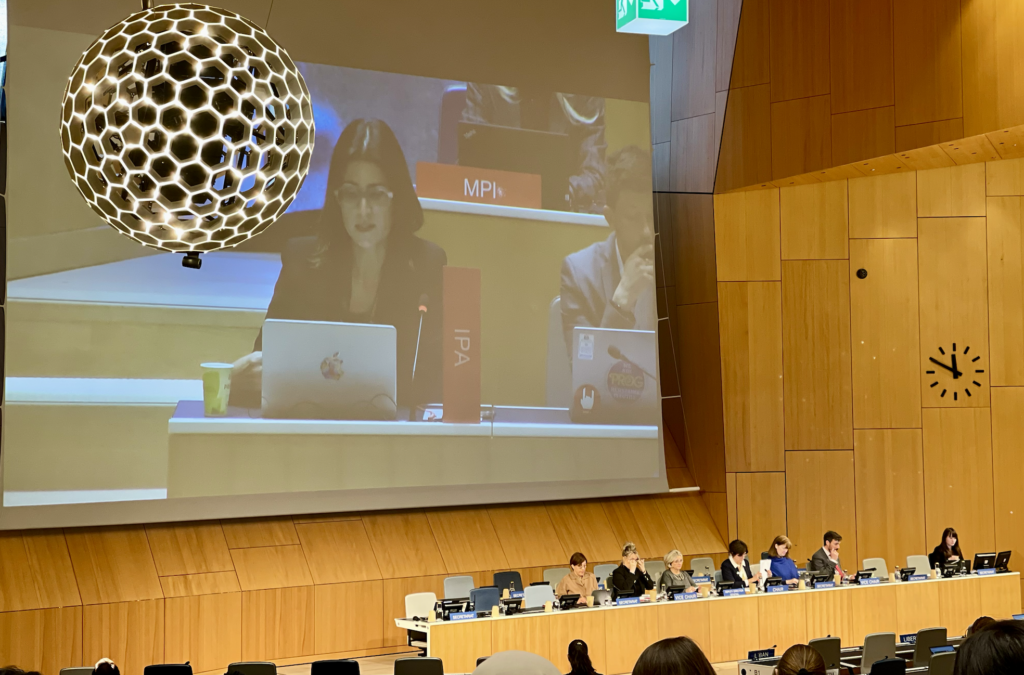SCCR 45’s third day was fully engrossed in tense discussions on Limitations and Exceptions
The IPA’s delegation was complete today with Karine Pansa, IPA President, José Borghino, Secretary General, and James Taylor, Director of Communications and Freedom to Publish, joined by Anne Bergman-Tahon (FEP, EU), Catherine Blache (France), Dan Conway (UK), Catriona Stephenson (UK), Ahmed Rashad (Egypt) and Jessica Sänger (Germany).
The plenary session for Limitations and Exceptions was opened once more by Chair Adriana Moscoso. The Secretariat presented their Implementation Plan for the Work Program on Exceptions and Limitations (document SCCR/45/6), taking into account comments from member states made for this SCCR session. The US also presented and summarized their proposal for the Updated Version of the Document “Objectives and Principles for Exceptions and Limitations for Libraries and Archives” (document SCCR/44/5).
Reactions to the draft implementation plan saw emotions rising in the chamber. The United States, Group B, the European Union, and a number of other member states welcomed the draft plan and thanked the Secretariat for their work, including their work on the WIPO Toolkit on Preservation for Cultural Heritage Institutions – Libraries, Archives, and Museums, and the success of the Virtual Panel on Cross Border uses in the Educational and Research Sectors.
On the other side of the aisle, the Africa Group, GRULAC, APG, and several other member states, expressed their disappointment at the draft implementation plan which they felt did not successfully include the ideas and objectives from the Draft Proposal by the African Group for the Implementation of the Work Program on Exceptions and Limitations (document SCCR/44/6). They expressed particular concern at the lack of a specific process for considering an international normative instrument.
The room was divided, with some members demanding a return to the African proposal and others wanting to move forward.
Observers were then granted 1 minute each with the range of views reflected those of the Member States.
On behalf of the IPA, President Karine Pansa provided the following intervention to the SCCR: “The International Publishers Association represents 101 publishers’ associations in 81 countries. We would like to Congratulate you and your vice chairs on your appointment and thank the secretariat for all of its work preparing this meeting. We welcome the continued efforts to exchange information and learn from different experiences around the world and for the time being dedicated to charting this Committee’s work in the future. We note the discussions so far and maintain our position that the current international copyright framework provides sufficient flexibility to Member States to support their creative and education sectors in a way that enables those who want to use copyrighted works to do so in a broad variety of ways.”
The tensions in the chamber then moved to informal discussions that lasted the remainder of the morning. A quiet afternoon in the plenary chamber was brought to a close by Moscoso announcing that regional groups were meeting with their own member states. The WIPO secretariat will now prepare a new working document based on the WIPO secretariat’s draft plan but including member state comments and elements from the African Group proposal. This new document will be a basis for resuming informal discussions tomorrow morning before the plenary reconvenes at 11:30am.
There were two side events on day 3. The first, entitled “Music streaming: how to fix a flawed business model,” was hosted by The International Federation of Musicians (FIM), The Federación Iberolatinoamericana de Artistas, Intérpretes y Ejecutantes (FILAIE) and The Societies’ Council for the Collective Management of Performers’ Rights (SCAPR).
The speakers at the event were FIM Secretary General Benoit Machuel, Peruvian featured artist Julie Freundt, PPL Chair and Chairman of the Trustees of the Royal Society of Musicians John F. Smith, Finnish soul singer and featured artist Jepa Lambert, and the Association of European Perfomers’ Organizations (AEPO-ARTIS) Head of Legal Nick Yule.
Machuel shared market figures and emphasized that the lived experiences of millions of artists are completely different from the exceptional earnings made by global superstars. Freundt and Lambert illustrated their own personal experiences, stressing their concerns that as the income of online music platforms continues to increase, the remuneration for artists on those platforms continues to decrease. Yule suggested the opportunity of equitable remuneration, as applied in countries like South Korea and Spain.
The evening side event was “The global recording industry – where to next?” hosted by The International Federation of the Phonographic Industry (IFPI).
The day concluded with the IPA delegation gathering for a dinner as we prepare for tomorrow’s discussions on generative AI and copyright.

